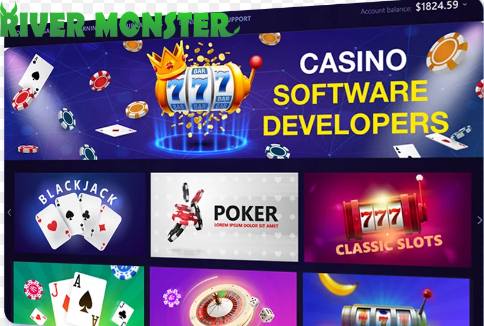Online casino software serves as the digital infrastructure that powers virtual gambling platforms on the internet, bringing the excitement and thrill of traditional casinos to players’ screens worldwide. From game development to security protocols, online casino software encompasses a range of elements essential for delivering a seamless and enjoyable gaming experience. Let’s delve deeper into the components and functionalities that make up casino software:
- Game Development: At the core of casino software lies game development, where software providers create a diverse array of games to cater to players’ preferences. This includes classic casino games such as slots, blackjack, roulette, and poker, as well as innovative variations and themed experiences. Game developers utilize advanced technologies, captivating graphics, and engaging gameplay mechanics to deliver immersive and entertaining gaming experiences.
- User Interface (UI) Design: User interface design is crucial for ensuring intuitive navigation and usability within casino software. A well-designed UI enhances the player experience by providing easy access to games, account settings, payment options, and support services. Intuitive menus, clear icons, and responsive design elements contribute to a seamless and enjoyable user experience across desktop and mobile devices.
- Security Measures: Security is a top priority in casino software to protect players’ personal and financial information from unauthorized access and cyber threats. Online casinos employ robust security measures such as encryption technology, secure payment gateways, identity verification procedures, and fraud detection systems to safeguard player data and ensure fair gameplay.
Integration Challenges: Implementing Online Casino Software
Integrating casino software poses unique challenges due to the complex nature of the gambling industry and the diverse requirements of gaming platforms. From technical considerations to regulatory compliance, navigating these challenges requires careful planning, collaboration, and expertise. Let’s explore some of the key integration challenges faced when implementing casino software:
- Technical Compatibility: One of the primary challenges in integrating casino software is ensuring compatibility with existing gaming platforms, backend systems, and third-party services. Online casino software must seamlessly integrate with various components such as payment gateways, customer management systems, and reporting tools while maintaining performance, stability, and security.
- Game Integration: Integrating a diverse portfolio of games into an online casino platform requires coordination between game developers, software providers, and platform operators. Each game may have its own technical specifications, APIs, and integration requirements, necessitating thorough testing and validation to ensure seamless gameplay and compatibility across devices.
- Regulatory Compliance: Compliance with regulatory requirements is a critical consideration when integrating casino software. Online gambling is subject to a complex web of laws, regulations, and licensing requirements that vary by jurisdiction. Integrating software that meets regulatory standards for fairness, security, responsible gambling, and player protection is essential for legal operation and maintaining a positive reputation.
- Security Protocols: Security is paramount in online gambling, and integrating secure casino software requires implementing robust security protocols to protect player data and financial transactions. Encryption technology, secure authentication methods, and fraud detection systems are essential components of casino software integration to safeguard against cyber threats and ensure player trust.
Mobile Adaptation: Accessing Online Casino Software Anywhere

The advent of mobile technology has transformed the way we access and interact with online services, and the gambling industry is no exception. Mobile adaptation of online casino software has become increasingly important, allowing players to enjoy their favorite games anytime, anywhere, directly from their smartphones or tablets. Let’s explore how mobile adaptation enables seamless access to casino software and enhances the overall gaming experience:
- On-the-Go Accessibility: Mobile adaptation of casino software provides players with unparalleled convenience and flexibility. Whether commuting to work, waiting in line, or relaxing at home, players can access their favorite casino games with just a few taps on their mobile devices. This on-the-go accessibility eliminates the need to be tethered to a desktop computer, enabling players to enjoy their gaming experience whenever and wherever they please.
- Responsive Design: Mobile-adapted casino software features responsive design elements that optimize the user interface and experience for smaller screens. User interfaces are redesigned to accommodate touch-based interactions, intuitive navigation menus, and streamlined gameplay controls. Graphics, animations, and layout are adapted to ensure clarity, readability, and usability on mobile devices, providing a seamless and enjoyable gaming experience.
- Cross-Platform Compatibility: Mobile-adapted casino software is designed to be compatible across various mobile devices and operating systems, including iOS and Android. Whether using smartphones or tablets of different makes and models, players can access the same gaming content and features without sacrificing quality or performance. Cross-platform compatibility ensures a consistent and cohesive experience across all devices.
Regulatory Compliance
Regulatory compliance is a cornerstone of the online gambling industry, ensuring that casino software operates within legal frameworks, adheres to industry standards, and upholds player protection measures. Compliance with regulations and licensing requirements is essential for online casino operators and software providers to maintain legality, integrity, and trustworthiness in their operations. Let’s delve into the key aspects of regulatory compliance in casino software:
- Licensing and Regulation: Online casino providers and operators must obtain licenses from regulatory authorities in jurisdictions where they operate. Licensing requirements vary by jurisdiction and may include rigorous background checks, financial audits, and compliance with specific regulations. Obtaining a valid license demonstrates a commitment to legal compliance and provides assurance to players that the online casino operates in a regulated and reputable manner.
- Fair Gaming Standards: Regulatory bodies impose strict requirements for fair gaming to ensure that casino software operates transparently and ethically. Online casino software must utilize certified random number generators (RNGs) to ensure the randomness and integrity of game outcomes. Regular audits and testing by independent testing agencies verify compliance with fair gaming standards and regulatory requirements.
- Responsible Gambling Measures: Responsible gambling is a key component of regulatory compliance, emphasizing player protection and harm minimization. Online casino must incorporate responsible gambling features such as self-exclusion options, deposit limits, time-out periods, and reality check reminders to promote responsible gaming behaviors. Operators are also required to provide resources and support for players affected by problem gambling.
Payment Processing: Financial Transactions
Payment processing is a crucial aspect of casino software, facilitating secure and efficient financial transactions between players and the casino platform. From depositing funds to withdrawing winnings, players rely on payment processing systems integrated into casino software to manage their finances safely and conveniently. Let’s explore the key components and functionalities of payment processing in casino software:
- Deposit Methods: Online casino offers a variety of deposit methods to accommodate players’ preferences and regional requirements. Common deposit methods include credit/debit cards, e-wallets (such as PayPal, Neteller, and Skrill), bank transfers, prepaid cards, and cryptocurrency. Players can choose the deposit method that suits their needs based on factors such as speed, convenience, security, and availability.
- Secure Payment Gateways: Payment processing in casino software relies on secure payment gateways to encrypt and process financial transactions securely. Payment gateways employ advanced encryption technology, such as Secure Socket Layer (SSL) encryption, to protect sensitive information transmitted between players’ devices and the Rivermonster casino’s servers. Secure payment gateways ensure that players’ payment details remain confidential and safeguarded from unauthorized access.
- Withdrawal Options: In addition to deposit methods, casino software provides various withdrawal options for players to cash out their winnings. Withdrawal methods may include bank transfers, e-wallets, cryptocurrency, and checks, depending on the casino’s policies and the player’s preferences. Withdrawal processing times vary depending on the chosen method and may be subject to verification and processing delays.
- Currency Support: Online casino software supports multiple currencies to accommodate players from different regions and jurisdictions. Players can deposit, wager, and withdraw funds in their preferred currency, eliminating the need for currency conversion and associated fees. Currency support enhances accessibility and convenience for players worldwide, ensuring a seamless and hassle-free gaming experience.
Conclusion
In conclusion, casino software stands as the technological backbone of the thriving online gambling industry, providing players with access to a diverse array of casino games and enabling secure financial transactions. Throughout this exploration, we’ve delved into the various components and functionalities of casino software, from game development and user interface design to security protocols and payment processing.
Online casino software has revolutionized the way players experience and engage with casino games, offering unparalleled convenience, accessibility, and flexibility. Whether on desktop computers or mobile devices, players can access their favorite games anytime, anywhere, with just a few clicks or taps.
Moreover, casino software prioritizes security and fairness, implementing stringent measures to protect players’ personal and financial information and ensure the integrity of game outcomes. Advanced encryption technology, random number generators, and fraud detection systems work in tandem to create a safe and transparent gaming environment for players worldwide.
FAQ
Q: Is online casino software safe and fair?
A: Reputable online casino software undergoes rigorous testing and certification to ensure fairness and security. It employs encryption technology, random number generators (RNGs), and strict regulatory compliance measures to protect players’ personal and financial information and ensure fair gameplay.
Q: Can I trust casino software?
A: Trustworthiness of casino software depends on factors such as the reputation of the software provider, regulatory compliance, and independent audits and certifications. It’s essential to choose licensed and regulated online casinos that use reputable software to ensure a safe and fair gaming experience.
Q: Can I play online casino games on mobile devices?
A: Yes, many casino software platforms are optimized for mobile devices, allowing players to access their favorite games on smartphones and tablets. Mobile-compatible websites and native apps provide a convenient and seamless gaming experience on the go.
